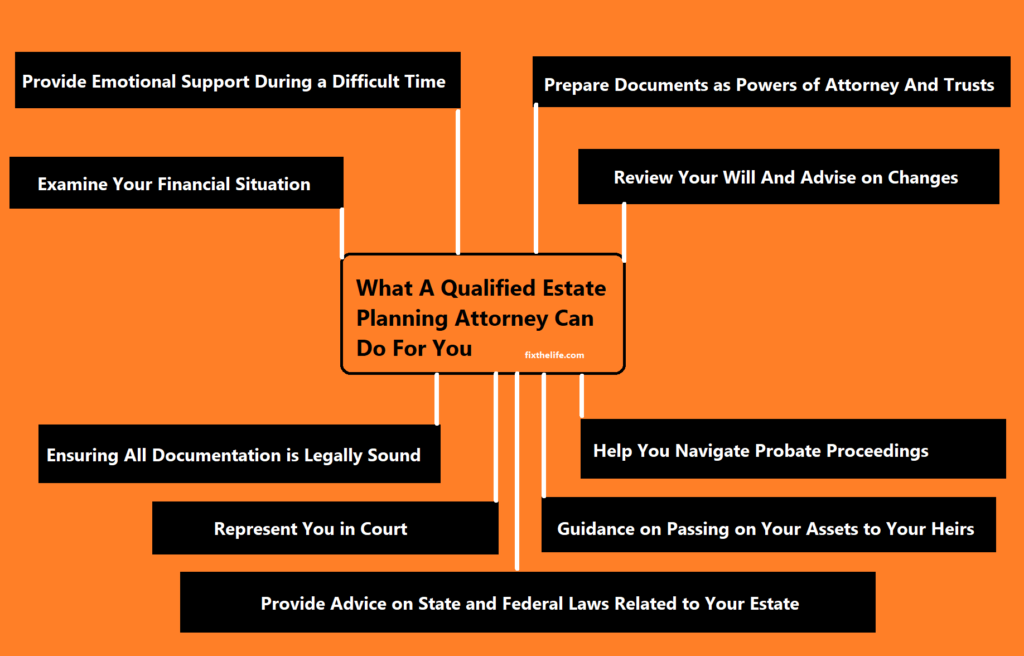Estate planning is an essential part of your overall financial picture. It is often a complicated and convoluted process with many questions and very few answers. But an experienced estate planning attorney can help you navigate these difficult waters and ensure that your wishes are carried out in the event of your death.
An estate planning attorney is qualified to provide advice and guidance on a wide range of topics, from drafting a will and setting up trusts to helping you take advantage of tax and other benefits.
With their knowledge and expertise, a qualified estate planning attorney can help you create an effective estate plan that considers your current and future needs.
In this blog post, we will explore the many ways a qualified estate planning attorney can help you protect your assets and provide for your family in the event of your death.

Examine Your Financial Situation
When you are getting ready to begin estate planning; one of the first steps an estate attorney will take is to examine your financial situation. This includes looking at your assets, such as bank accounts, investments, real estate, and any other possessions you may have.
Your attorney will also review any debts you may have, such as credit cards, mortgages, or other loans. This step helps your attorney determine what estate planning options are available to you and which ones may be most beneficial for your situation.
Your attorney can also better advise you on the most appropriate strategies for you to ensure that your assets are distributed according to your wishes.
ALSO READ: Guide to Understanding Real Estate Deeds: What You Need to Know
Review Your Will And Advise on Changes, If Necessary.
A qualified estate planning attorney can review your will to ensure that it properly reflects your wishes and intentions.
Suppose there are any changes that need to be made, such as updating beneficiaries or making sure you have an adequate amount of assets allocated for taxes and other debts.
In that case, your attorney can advise you on the best way to make those adjustments. Your attorney can also review any trust documents to ensure they are up-to-date.
ALSO READ: What is Living Trust vs Will?
Prepare Additional Documents, Such as Powers of Attorney And Trusts.
After you have drafted a will, an estate planning attorney can help you prepare additional documents for your estate plan.
These documents, such as powers of attorney and trusts, can provide additional protection for your assets in the event of your incapacity or death.
A power of attorney document gives another person the authority to manage your finances and make decisions on your behalf, while a trust can help you manage your assets more efficiently.
An estate planning attorney can help you understand these documents’ benefits and ensure they are properly executed.
ALSO READ: REAL ESTATE INVESTMENT TRUSTS – REITs: COMPLETE GUIDE
Make Sure All Documentation is Legally Sound.
What an estate planning attorney does is he can provide invaluable assistance when it comes to ensuring that your documentation is legally sound.
This is an incredibly important part of the estate planning process, as any errors in the legal framework can have serious consequences for your family after you’ve passed away.
An experienced attorney can help make sure that all relevant information is included in the documents and that they are properly documented.
ALSO READ: What is a grantor of a trust? Grantor & Grantee Definitions
Provide Guidance on How to Best Pass on Your Assets to Your Heirs
Passing on your assets to your heirs is an important part of estate planning. It can be a complex process, as there are many legal and tax considerations to keep in mind.
An estate attorney can help you navigate this process. They will work with you to create a plan that best meets your goals and those of your heirs.
Your attorney can also provide guidance on the best way to protect your assets from any potential creditors and on how to structure any gifts or bequests you may be making.
They can also help you decide when and if using a trust to pass on your assets is appropriate.
Represent You in Court, if Necessary
Sometimes, it may be necessary to go to court to settle any disputes over your estate after your passing. An experienced estate planning attorney can represent you in court and help ensure that your wishes are respected.
They will also be able to provide guidance on the best way to move forward with a court case and how to ensure that all legal requirements are met.
In some cases, an estate attorney may also be able to help negotiate a settlement outside of court, saving both parties time and money.
ALSO READ: What is The Difference Between A Will And A Trust?
Provide Advice on State and Federal Laws Related to Your Estate.
Estate planning involves understanding the law. An experienced estate planning attorney can provide advice on state and federal laws related to your estate, such as probate regulations, tax rules, and other legal requirements.
Additionally, they can help you understand any changes in the law that may affect your estate plan. With their guidance, you can be sure that your estate plan is up-to-date and complies with all relevant regulations.
Probate is the legal process of distributing a person’s assets after they have passed away. An experienced estate attorney can provide invaluable help in navigating these proceedings and ensuring that your wishes are respected.
They will also be able to advise you on how to minimize any taxes or other fees that may be associated with the probate process.
ALSO READ: GRANTOR VS. GRANTEE – WHAT’S THE DIFFERENCE?
Provide Emotional Support During a Difficult Time.
Estate planning can be an emotionally challenging process, and it is important to have someone you trust to provide guidance and support during this time.
An experienced estate attorney can provide legal counsel and emotional support when making difficult decisions. They can help ensure that your estate plan reflects your wishes and provide peace of mind in a difficult time.
In conclusion, an experienced estate planning attorney is a valuable asset when it comes to creating an effective estate plan. They can provide invaluable assistance with everything from drafting documents to navigating probate proceedings.
With their guidance, you can be sure that your estate plan is legally sound, your wishes are respected, and that your family will be taken care of after you’re gone.
ALSO READ:
How Many Jobs are Available in Real Estate investment Trusts




